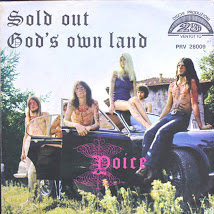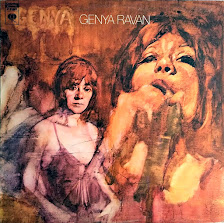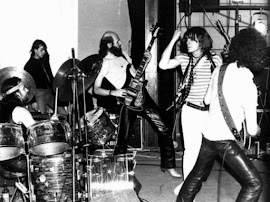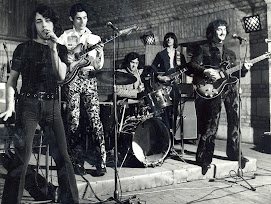password: tdats
Welcome to volume 154 of The Day After The Sabbath. This is the 6th episode to focus on female vocalists and girl-fronted bands.
So far those six are: 17 (link), 49 (link), 71 (link), 97 (link), 129 (link) and 154 (link).
We have the usual varied mix of styles, from 1971 to 1979, with prog, psych, funk and metal covered. Everything finely-tuned for your heavy listening pleasure...
TRACKS
01. Pancake - Fire-And-Rain-Song (1979)
from album No Illusions
02. Cameleon - Je Hurle Que Je T'aime (1971)
single
03. Groundstar - Come To The Mountain (1978)
from album Forced Landing
04. Claudia Lennear - Not At All (1973)
from album Phew!
05. Nanette Workman - Love Taker (1977)
from album Grits And Cornbread
06. Marsha Hunt's 22 - (Oh, No! Not!) The Beast Day (1973)
from album Rock Discotheque
07. Yoice - God’s Own Land (1971)
single
08. Gold - Home Cookin' Woman (1971)
from album Mission Rock
09. Gayle McCormick - Flesh and Blood (1972)
from album Flesh And Blood
10. Sarolta Zalatnay - Move Over (1975)
from album Sarolta Zalatnay
11. Genya Ravan - Lonely, Lonely (1972)
from album Genya Ravan
12. Lydia Taylor - Tuff Chick (1979)
from album Lydia Taylor
13. Chris Braun Band - Town Of Children's Blocks (1972)
from album Both Sides
14. Yvonne Elliman - I Can't Explain (1973)
from album Food Of Love
15. Xciter - I'll Get Over You (1979)
from album Xciter
16. Nanette Workman / Peter Frampton - Love Taker [alt. version] (1977)
Improved sound quality, slightly slower tempo
 |
| Pancake c.1979 |
This is a really great progressive rock track that has the metallic feel of the NWOBHM to my ears. No Illusions is a good album too, with vocals from Biggi Zmierczak, who was a new addition to Pancake for this record, which I think is their best release. Unfortunately it seems to be their last also. A cursory look for information on Biggi Zmierczak doesn't bring up much of use unfortunately, maybe that was an assumed name for Pancake? Drop me a line if you know more about Biggi that I can add here...
Cameleon - Je Hurle Que Je T'aime (1971)
Other members who came and went were: Alain Lecointe (bass) and Patrick Mazie, who were later in Hechetu Welo and jazz fusion band Nadavati. Jacques Liot (guitars) was also later in Nadevati (see soleilzeuhl.com). Jean-Pierre Chenut (guitars) was in Dispray Karma Sex All Stars. Jean-Loup Besson (drums, ex-Gypsys/Quo Vadis) and Roberto Toffoli (drums, later in W.B.S.) were also involved.
 |
| Sharon Jordan in Groundstar (lower right) |
Here's another re-appearance, this time from a band that were in my heavy AOR special in 2013 (link). This is another case of a record that is good enough for some more attention. So far the only member of Groundstar who has come up in other bands is our singer here, Sharon Jordan. She was in various bands after Groundstar such as The Heritage and Eve's Burden (info at gdmonline and metal-archives).
I recently saw a George Peppard sci-fi drama on TV called The Groundstar Conspiracy. Inspiration for the band's name maybe? We may never know as nobody has published interviews or any other insider information regarding the band. As yet they remain something of a mystery, even though the album has developed a good reputation with obscure AOR fans.
Claudia became known in Soul trio The Superbs, when she was offered a place in Ike & Tina Turner's Ikettes. From there she became an in-demand backing singer for many famous acts such as Freddy King, Humble Pie and Joe Cocker. She dated Jagger and David Bowie and according to Wikipedia, she said the song I used here, "Not At All", was written as a response to Mick Jagger afterwards. You can see a recent (2022) two-part interview with Claudia on youtube, where she comes across as the nicest person you could ever meet and talks about her post rock n roll career as a church singer and school teacher (1 , 2).
Nanette Workman - Love Taker (1977)
Here's a really cool track from Nanette Workman's seventh album. She had been a Canada-based pop singer since the mid sixties and by the mid seventies, she had moved with the times to rock, funk & disco in collaborations with various musicians including her brother Billy Workman, who made albums of his own also. Her 1977 album "Grits And Cornbread" is described thus by DisKebec at Discogs "This is a superb country-tinged rocking Nanette Workman album recorded at the Olympic Studios in the UK and it features a top-notch band and supporting cast ...including Peter Frampton, Johnny Hallyday (producer [and one-time boyfriend]), Status Quo bassist Andy Bown, Spooky Tooth drummer Mike Kellie, as well as Bobby Keys, Doris Troy and Madeline Bell." (link).
Love Taker was written by Gary Wright and as it turns out, he recorded a version of it in 1972 (link) which was never heard until an archival collection called Gary Wright And Wonderwheel: Ring Of Changes was released in 2016. Wonderwheel consisted of him and other notable names like Archie Legget (see tdats 66) and guitarist Mick Jones (pre-Foreigner).
You can read a lot on that subject elsewhere, and her relationship with Mick Jagger (link), and you can choose what to believe, it's all just rock and roll legend / myth these days, the main thing is the music, and Marsha belts out the soulful rock n roll with the best!
Since those days Marsha has become an actress, author and human rights activist, wikipedia states she has announced work on a biography of Jimi Hendrix, being in the perfect position to do as a fellow black American artist that came to London around the same time to find success.
 |
| Yoice single (1971) |
Here's a half-time chillout with vocals from Jutta Nienhaus. Yoice was an initial name of Analogy, a band of Germans who met in academia in Italy in the late 60s. Analogy also recorded a version of this song in Italian (link), which can be heard on later archival releases. They have a fairly complex history involving aliases like The Joice, Earthbound and Eternity, that you can read about in an interview with founder Martin Thurn-Mithoff at PsychedelicBaby (link).
Jutta and Martin resided in London for a period in the late '70s and started the new wave band "Earthbound", who made one self-released EP. There were many Analogy-related shows and reformations through the following years but sadly both Jutta and Martin passed away in 2018. The official Analogy website still exists, with a full history and picture gallery (link).
 |
| Robin Sinclair c.1968 |
Robin Sinclair is the songstress on this fantastic nugget of San Franciscan acid rock. She was previously part of Salloom-Sinclair & The Mother Bear, who I have featured on the tdats youtube channel (link).
Gold, from the Bay Area, never made an official release but archival collections have come from Rockadelic and World In Sound (link) in recent decades, confirming what a tight, accomplished and heavy act they were. The fact that the track I included here is a recording of a show, and it sounds as good as it does, proves it beyond doubt. There is a Gold interview with Ed Scott (guitar) and Ron Cabral (manager) at PsychedelicBaby (link).
.jpg) |
| Gayle McCormick Flesh and Blood LP 1972 |
In the '70s she made three solo albums, the most interesting of which to rock n'roll fans such as ourselves is 1972's "Flesh & Blood", which included our track here, among other good stuff like "Grey Line Tour" and "Alabam". Having abandoned the music industry and what she considered to be its unhealthy excesses a long time ago in the '70s, sadly Gayle passed away from throat cancer in 2016.
 |
| Sarolta Zalatnay - s/t 1975 |
Sarolta is one of Hungary's famous pop singers, who I discovered while researching the recent Hungarian TDATS (link), because her material included quite a lot of psychedelic stuff, gladly. She will be appearing in the next volume focusing on the country. Before that she appears on TDATS for the first time here with a great cover of a Janis Joplin classic.
Discerning readers will be interested to know that the backing group on this self-titled 1975 album was no less than the awesomely fun and quirky rockers Skorpió, (see vols 13 & 41) who are close to a tdats institution by this point.
 |
| Genya Ravan LP 1972 |
Genya's band called Ten Wheel Drive appeared here back in vol129 (link), a New Jersey jazz-rock ensemble fronted by the Polish-born, powerfully-voiced Genya Ravan (real name Genyusha Zelkovicz). They managed four albums and delivered a few hard-rocking tracks on each one.
She first found success as 'Goldie' Zelkowitz in the early '60s, after joining doo-wop band The Escorts, then forming Goldie & The Gingerbreads, advertised as the first all-girl rock n roll band ever to get signed by a major label in the USA.
The track I have included here is from the first of many solo albums she made, since then being known as Genya Ravan. Genya has remained active in music as a radio DJ, performer and producer right up until the modern day, she had a new album in 2019, and in 2021 a new single (link) at the age of 80, with Nile Rogers on guitar! Further recent news on Genya can be found at: forward.com (link), Wiki (link) and her official website (link).
 |
| Lydia Taylor LP 1979 |
I came across this one listed in Kerrang's International Encyclopedia of Hard Rock and Heavy Metal, written in the early eighties and revised a couple of times later. This song kinda is metal, all the forthright claims from Lydia remind me of a Dio song in that self-assured metal way. But the rest of the album is not metal and barely hard rock. The book is full of bands like this, and some a lot less heavy than anything Lydia Taylor did. Maybe the authors ran out of ideas after 100 or so metal bands and looked-up random records in their collections to pad the book out?
Anyway, I don't mean to denigrate the book, it helped me find this and a lot of cool tracks, metal or not! I just find it amusing in these days of the internet, where any list of recommended "hard rock & heavy metal" which included jazz fusion albums from the early '70s, as Kerrang's Encyclopedia did, would probably get the author fired by their respective media outlet. One explanation may be that in the pre-internet days (yes I am old enough to remember those) when people relied on live shows, books / magazines, radio, shops, friend's recommendations and other such "physical" experiences to discover music, the necessity to pigeonhole acts into easily-ordered, searchable dropdown lists didn't exist, and maybe that has altered the way people look at genre now.
 |
| Chris Braun Band |
I discovered Chris Braun while looking into albums produced by Krautrock legend Dieter Dirks, for the Dirks-themed Vol135 (link).
This is a track from the first of their three albums, and I think this album is the best for TDATS considerations, with a few fairly heavy prog cuts. Prog Archives states that Chris Braun wrote the songs, sung for the band and was founder of the group. Her gravelly voice may be compared to Inga Rumpf of Frumpy. Her songs are a combination of folk-rock, jazz-fusion, heavy blues and hard rock. I think "Town Of Children's Blocks" shows the acoustic folk side melding with the heavy prog in a very cool way, to use a modern equivalent, not unlike Opeth.
The band took a long break after the second album but reappeared ten years later with a synth pop / new wave album, amusingly entitled "Ultra Braun", this time sung in German unlike their first albums, with Kraftwerk-isms in place, and it's a worthy listen if that's something in your zone of interest.
 |
| Yvonne Elliman as Mary Magdalene in the Jesus Christ Superstar movie (1973) |
On the home straight now and we have a Who cover from a girl who, like other names here, I discovered by looking into backing singers of other acts that I have shown before. In this case Yvonne was on the Long John Baldry album that appears in blues rock special vol147 (link).
Born in Hawaii, but like Claudia and Marsha, making her career in London UK, she met Ian Gillian while working on Andrew Lloyd Webber's Jesus Christ Superstar musical, and is also known for many '70s tours with Eric Clapton, as well as her solo career which spanned the seventies.
Another interesting thing I discovered from looking into this song, was it's inclusion on a label sampler called Purple People Vol 1 (link). Purple Records was a label owned by Deep Purple's management team, publishing such TDATS-interest artists as Tucky Buzzard, Hard Stuff and Trapeze, multiple Deep Purple-related acts, and pop music like Talk Talk and even Doctor Who music.
 |
| Lisa Baker |
Xciter's music has been released posthumously on CD in the 2000s. Four tracks on those CDs feature a singer credited as "Lisa Furspanker", and "I'll Get Over You" is one of them.
In reality this is Lisa Baker, who also sung in a pre-Great White outfit called Dante Fox, as well as her own band, which was featured in a 2022 Numero Group comp of similarly obscure Californian metal acts called "Bound For Hell: On The Sunset Strip".
-------------------------------------------------------------------------
Related listening:
The Day After The Sabbath 136: Mainline Riders [guest-curated, old and new bands]
The Day After The Sabbath 127: Blue Planet [Dutch band history, music & interview]
The Day After The Sabbath 122: Sonata in Z [long tracks #1]
The Day After The Sabbath 100: Reel Ravers [100th anniversary movie rock special]













.jpg)







































